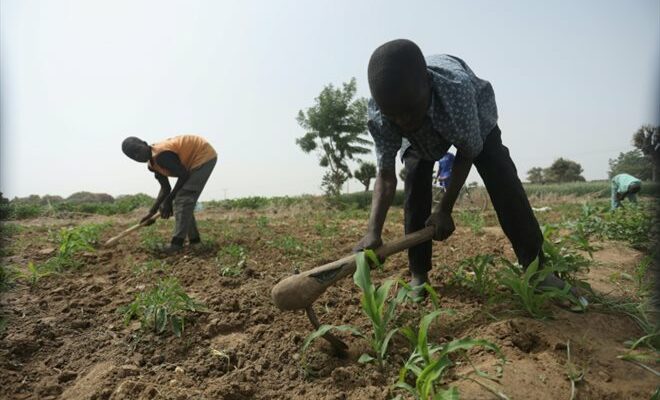Sign indicating the border, closed since August 2023, between Niger and Nigeria, February 17, 2024 in the Nigerian locality of Jibia (AFP/Kola Sulaimon)
Three sisters, babies tied to their backs, advance under the bright midday sun to cross the border between the rural state of Katsina, in the conservative Muslim northwest of Nigeria where they live, and Niger, where their father resides, in order to go to a wedding.
This banal journey has, however, been officially forbidden to them since August 2023 and the sanctions imposed on Niamey by the Community of West African States (ECOWAS) after the takeover of power in Niger by a military junta.
The road where trucks and cars continually passed by has been silent for almost seven months.
“Motorcycle drivers avoid going through the border post and take a detour, they charge too much, that’s why we walk,” explains Sa’adatu Sani, 30, who was unable to spend the 800 naira (0.50 dollars) charged by the motorbike taxi to go from Jibia to the Nigerian village of Dan Issa, 18 kilometers away.

Women approach the border, closed since August 2023, between Niger and Nigeria, on February 17, 2024 in the Nigerian town of Jibia (AFP/Kola Sulaimon)
Like so many other Nigerians at the border, the three sisters continue to go to the other side, either through the Jibia border post, where the authorities turn a blind eye to travelers on foot, or by the parallel paths where they venture motorists and even certain traders, at the risk of having their goods seized by customs officials.
– Double penalty –
A few hundred meters away, the famous Jibia Sunday market buzzes slowly. The crowds are much lower than before the border closed.

Traffic near the market in the Nigerian town of Jibia, bordering Niger, February 18, 2024 (AFP/Kola Sulaimon)
“Nigerians came here to sell beans, dates, and bought our corn, our sorghum… Now we have to find other customers when all we have known until now was cross-border trade,” laments Ibrahim Lawal Makiyayi, 53, who grows fruit and vegetables on the edge of the city, the capital of a district of nearly 300,000 inhabitants.

A man sells tomatoes on the market in the Nigerian town of Jibia, bordering Niger, February 18, 2024 (AFP/Kola Sulaimon)
In this state considered the country’s grain basket, “we have difficulty eating three meals a day”, complains Hamza Lawal, a truck driver whose activities have come to a standstill since the border closed.
Nigeria, which shares 1,600 km of border with its neighbor, was until now one of Niger’s main trading partners with $193 million in exports in 2022 according to the United Nations (electricity, tobacco, cement, etc.) .

Goods stored in the market in the Nigerian town of Jibia, bordering Niger, February 18, 2024 (AFP/Kola Sulaimon)
Since the border closure, it has even been a double whammy for the local population, who have seen food prices explode under the combined effect of new movement restrictions and galloping inflation after the Nigerian president , Bola Ahmed Tinubu, in office since May, implemented economic reforms which plunged the country into crisis.
In January, inflation was close to 30% and Nigerians are crushed by the cost of living.
In Jibia, a 100-kilo bag of millet or corn has doubled in one year and currently sells for 60,000 naira ($40).

Sacks of coal unloaded on the market in the Nigerian town of Jibia, bordering Niger, February 18, 2024 (AFP/Kola Sulaimon)
The current crisis leads to pessimism by Hassan Issa, regional coordinator of Médecins Sans Frontières (MSF), who fears that malnutrition, already recurring here, will reach new heights this year, especially since Ramadan is due to start in March, encouraging families ” to quickly deplete their reserves during this holiday season.
– Looting, ransoms and law enforcement –
In addition to trade difficulties, residents of this rural region face endemic insecurity that has worsened since the border closed.

Sellers in the market in the Nigerian town of Jibia, bordering Niger, February 18, 2024 (AFP/Kola Sulaimon)
For years, armed groups called “bandits” have been raging in the region, pillaging, confiscating land and killing in their path.
“We bought our cattle from Nigeriens, we raised them and resold them to live, now we have almost nothing because the bandits are stealing our animals,” laments breeder Musa Abdullahu, 67.
With the closure of the border and the disappearance of their job and income prospects, some young Nigerians are being tempted by banditry.

A corn seller in the market in the Nigerian town of Jibia, bordering Niger, February 18, 2024 (AFP/Kola Sulaimon)
“People have nothing to do, they kill time, start using drugs. Poverty pushes you to the worst, to theft, to murder, to everything, to survive,” laments Sade Rabi’u, 57 years old, traditional chief of Jibia.
But insecurity linked to bandits is not the only enemy of the inhabitants.
“The closure of the border has created opportunities for bandits but also for security agencies who do not hesitate to confiscate goods and demand bribes,” insists Philip Ikita, project director for the NGO Mercy Corps in Katsina.

Farmers on a farm in the Nigerian town of Jibia, bordering Niger, February 17, 2024 (AFP/Kola Sulaimon)
On the 50 kilometer road which leads from Katsina, the capital of the eponymous state, to Jibia, checkpoints follow one another. Police officers, soldiers or self-proclaimed controllers shamelessly rob travelers.
“Bandits must hide, operate in the shadows, while those who are supposed to enforce the law and protect citizens actually constitute the worst burden on trade and free movement,” Philip Ikita bitterly asserts.
© 2024 AFP
Did you like this article ? Share it with your friends using the buttons below.




